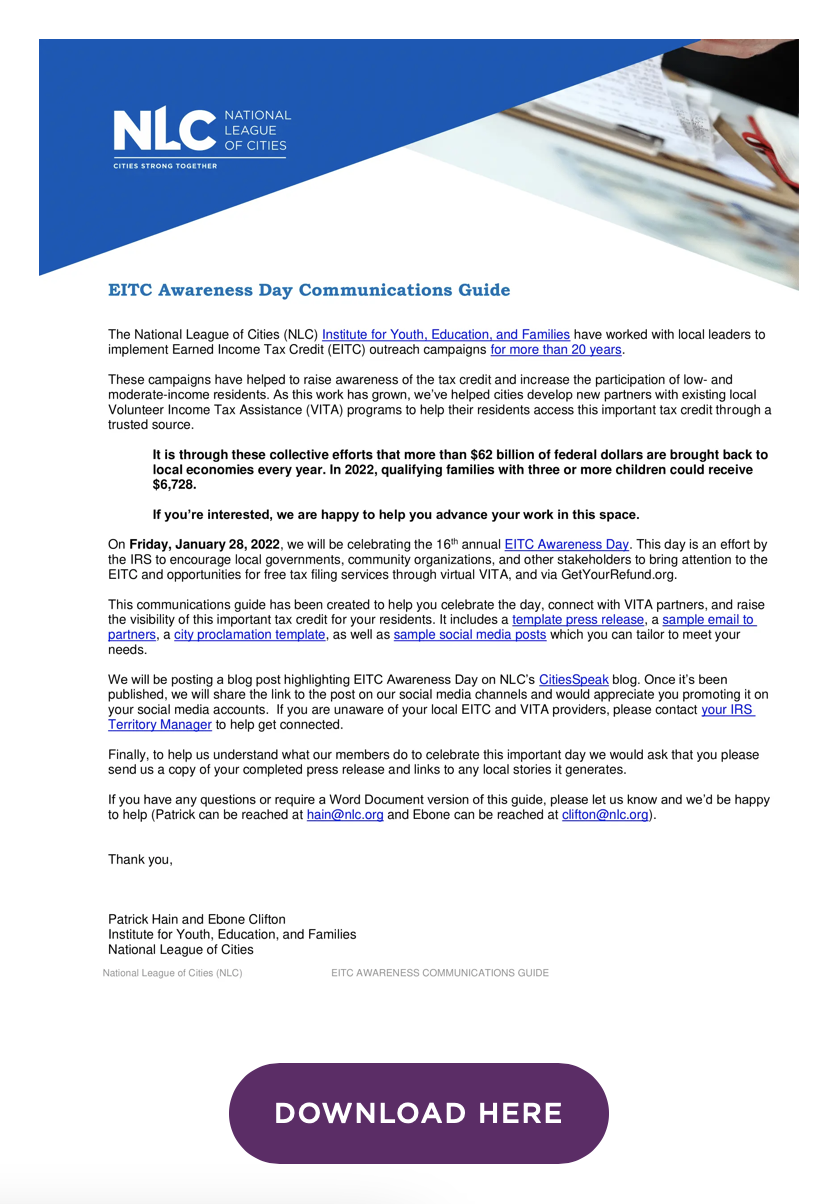It’s the most wonderful time of the year –tax season!
Tax season offers an opportunity for municipalities of all sizes to receive federal funds without applying or asking the federal government for assistance. These funds go directly into residents’ bank accounts, but they need to claim the money.
For many low-income families, the tax season offers an opportunity to receive additional monies by claiming the federal Earning Income Tax Credit (EITC), Child Tax Credit (CTC), and state tax credits. These funds are often the largest single injection of money they will receive in the year. These funds can provide financial stability to households by helping pay back rent, purchase tires for their car and school supplies, or even a gift for their children.
In 2020, 25 million eligible workers and families received about $62 billion from the EITC. An average of $2,461 per return went a long way for households living paycheck-to-paycheck. This tax season, families with two children who earned less than $47,915 (or less than $53,865 for married workers) are eligible for a credit of up to $5,980 for the EITC alone!
Local leaders should understand the tax changes that can boost their residents’ incomes and where residents can go to claim these funds. Some of the significant tax changes that municipal leaders should understand are:
1. EITC Has Been Expanded
The American Rescue Plan Act (ARPA) temporarily expands eligibility and increases the maximum credit for individuals without children who qualify for the credit. The maximum credit for these individuals increased from $543 to $1,502. The legislation allows workers without children between the ages of 19 and 24, and those over age 64, to claim the EITC. Additionally, ARPA lowered the age of eligibility for former foster youth and youth experiencing homelessness from 25 to 18. These individuals are eligible for the first time and may not know that they can receive these funds nor where to go to get help to claim them.
2. Parents Need to Claim the Child Tax Credit
The American Rescue Plan Act also changed the Child Tax Credit (CTC). Parents and caregivers who did not receive monthly CTC payments can claim the full amount on their tax returns. Without Congressional action, the amount of the CTC will be smaller moving forward.
3. Volunteer Income Tax Assistance Program Keeps More Money in Residents Pockets
The Volunteer Income Tax Assistance (VITA) program operates throughout the country, offering free tax preparation services to tax filers making less than $57,000. VITA, widely regarded for its accuracy and trustworthiness, has saved individual clients hundreds of dollars that serve as lifelines for their families and support for local economies.
COVID-19 has impacted VITA services across the country, so local leaders should connect with their providers to confirm their operations for the tax season. The non-profit organization Code for America has supported VITA partners through their site GetYourRefund.org. GetYourRefund.org allows tax filers to review their tax situation with simple questions, securely upload their tax documents, and get connected with VITA to answer their questions.
Tax season offers local leaders an opportunity to help residents claim refundable tax credits to provide financial support during these challenging times.
Let NLC deliver for you!
The National League of Cities (NLC) is your partner in recovery. This is the time for America to do more than survival we can thrive.
NLC is a strategic partner for local leaders and municipal staff, serving as a resource and advocate for communities large and small. Click the button to learn how NLC can help deliver for your city.


